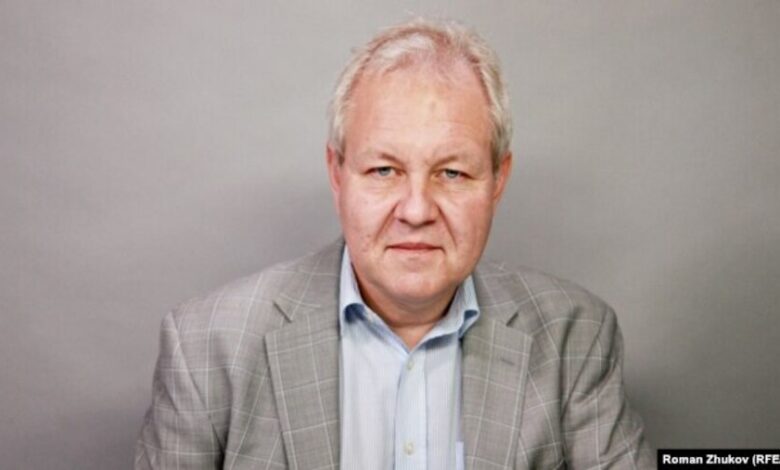“The West’s attempt to undermine Russia economically has led to the opposite result, and Russians are quite happy with the war.” Vladislav Inozemtsev

The war that Russia is waging against Ukraine causes different reactions among Russian citizens. Basically, part of the population supports the actions of the authorities, seeing in them the need to “protect national interests.” On the other hand, there are those who express dissatisfaction, but mostly these are criticisms due to domestic troubles or personal difficulties caused by mobilization or economic sanctions. The most Westernized Russian cities, such as Moscow and St. Petersburg, according to many analysts, show a fairly neutral or even positive reaction to the consequences of the war on their lives and economies.
Political scientist, doctor of economic sciences, head of the Center for Research on Post-Industrial Society Vladyslav Inozemtsev expressed his opinion on this matter. He notes that neither Ukraine’s invasion of the Kursk region nor Western sanctions have caused mass discontent among the residents of these largest Russian cities. Two and a half years after the start of a full-scale invasion, Russians seem to feel less of the impact of the war than they did in 2022. This applies not only to “ordinary” citizens, but also to the wealthy population, which, despite the sanctions, remains satisfied with its standard of living.
Vladyslav Inozemtsev notes:
“This came as a surprise to many Western politicians and Russian dissidents, who had placed certain hopes on the dissatisfaction of Muscovites and St. Petersburgers with the “war economy”, because such attributes of luxury as Western boutiques, unlimited use of the Internet and even easy weekend trips to European capitals have disappeared. But although Russia has become much more cut off from the West—you can only get to Paris or Berlin through Istanbul or Doha, and you need a VPN to access “forbidden” sites, all of this annoys too few people to cause any significant reaction.
How can one explain such silence in those Russian communities, which are considered the most Westernized throughout the country? I would offer a rather paradoxical answer. Moscow and other Russian metropolises have become much more Westernized in recent years, despite the fact that Russia is the West’s most desperate adversary.
Looking at Moscow, we see a huge concentration of wealth, thanks to which the capital brings 20% of all taxes to the federal budget of Russia, as well as a rapid modernization of the city’s infrastructure and the development of various digital services that are almost not available anywhere else.”
The political scientist believes that Western sanctions led to a sharp reduction in Russian capital exports, which were previously directed to Europe, especially in the form of investments in elite real estate. Instead, capital is now directed to Moscow, St. Petersburg and their surroundings, which has caused a sharp increase in real estate prices. Inozemtsev notes that since 2021, the price of an apartment in Moscow has increased by 43%, and the city government has invested huge funds in the development of transport infrastructure and stimulation of business in the service sector.
“Over the past ten years, 78 new Moscow Metro stations have been built, more than in the previous four decades, and the suburban train network has been integrated into a wider rail system that now resembles the Paris Métro-RER network. The city has the largest fleet of all-electric buses of local production in Europe, and river electric trams strengthen the transport infrastructure of Moscow.
Despite the fact that Visa and MasterCard have suspended their operations in Russia, Russians continue to use the Central Bank’s instant payment system, which allows you to transfer any amount of money instantly and without commission using a mobile phone number as an identifier. Russian capital cities are ahead of European metropolises in the use of QR-code payments and facial recognition in financial transactions, and mobile communications in Russia remain the cheapest and fastest in Europe. Grocery stores carry the same range of goods as before the war, including French wine and Italian pastries. In addition, home delivery of products and goods by autonomous bots is commonplace,” – emphasizes Inozemtsev.
He notes that stores in Moscow and St. Petersburg offer almost the same assortment of goods as before the war, including French wine and Italian confectionery. Home delivery of groceries and other goods with the help of autonomous robots has also become commonplace in Russian megacities.
Of course, the consequences of the war are felt even in the most prosperous regions of the country. The mass emigration of 2022, the increase in mobilization and the lack of labor are felt even in Moscow and St. Petersburg. However, the number of mobilized residents of these cities is not so large, and even record signing bonuses do not attract residents. At the same time, growing demand leads to higher wages in local companies. As Inozemtsev emphasizes, some Russians who left the country at the beginning of the war are now returning, having failed to integrate into European society.
Even some Western celebrities, such as economist Jeffrey Sachs, participate in glamorous international events, such as the recent BRICS Urban Future Forum, which was attended by dozens of mayors of major cities from Asia, Africa and the Middle East. This, according to Inozemtsev, further confirms that Russian megacities differ from the rest of the country in their prosperity even in wartime.
Inozemtsev also notes that Russian society after communism has become extremely individualized, it focuses on personal solutions to systemic problems.
“These people are not so much worried as they are happy about the departure of liberal Russians and welcome the positive economic changes they see in their daily lives.
This economic progress, fueled in part by the confrontational policies of the West, has undermined anti-Putin sentiment in the country far more than any other factor. Today, it outweighs the reduction of political freedoms in the country in recent years – because few people claim these freedoms, and economic prosperity is felt by everyone.
Thus, the West’s attempt to undermine Russia economically starting in 2022 has backfired — at least for now.” – summarizes Vladyslav Inozemtsev.
The expert expressed a personal opinion, which may not coincide with the editorial position.





